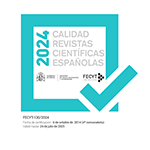Patria on stage: Cicero and the use of prosopopoeia
Abstract
Ancient rhetoricians knew how important the use of theatrical techniques was to increase the persuasive effect of rhetorical arguments. Therefore, training with theatrical techniques of voice modulation, breathing exercises and physical exercises was strongly recommended. This way the orator became similar to the histrio, because both shared the actio. Cicero himself puts these theoretical precepts into practice, in his intense oratorical activity, by impersonating the characters he defends or accuses, reproducing their words, revealing their character, as if he were performing on stage. Quintilian recognizes Cicero's mastery in playing parts even in the first speech against Catiline in the Senate, when Cicero plays the part of an abstract entity, Patria, the Fatherland (Cic.Catil.1,18 and 1,27-29): the theatrical fiction of prosopopoeia supports Cicero’s rhetorical and political strategy. He has more effective influence on the audience and persuades them to act harshly against Catiline
Downloads
Article download
License
In order to support the global exchange of knowledge, the journal Cuadernos de Filología Clásica. Estudios latinos is allowing unrestricted access to its content as from its publication in this electronic edition, and as such it is an open-access journal. The originals published in this journal are the property of the Complutense University of Madrid and any reproduction thereof in full or in part must cite the source. All content is distributed under a Creative Commons Attribution 4.0 use and distribution licence (CC BY 4.0). This circumstance must be expressly stated in these terms where necessary. You can view the summary and the complete legal text of the licence.








